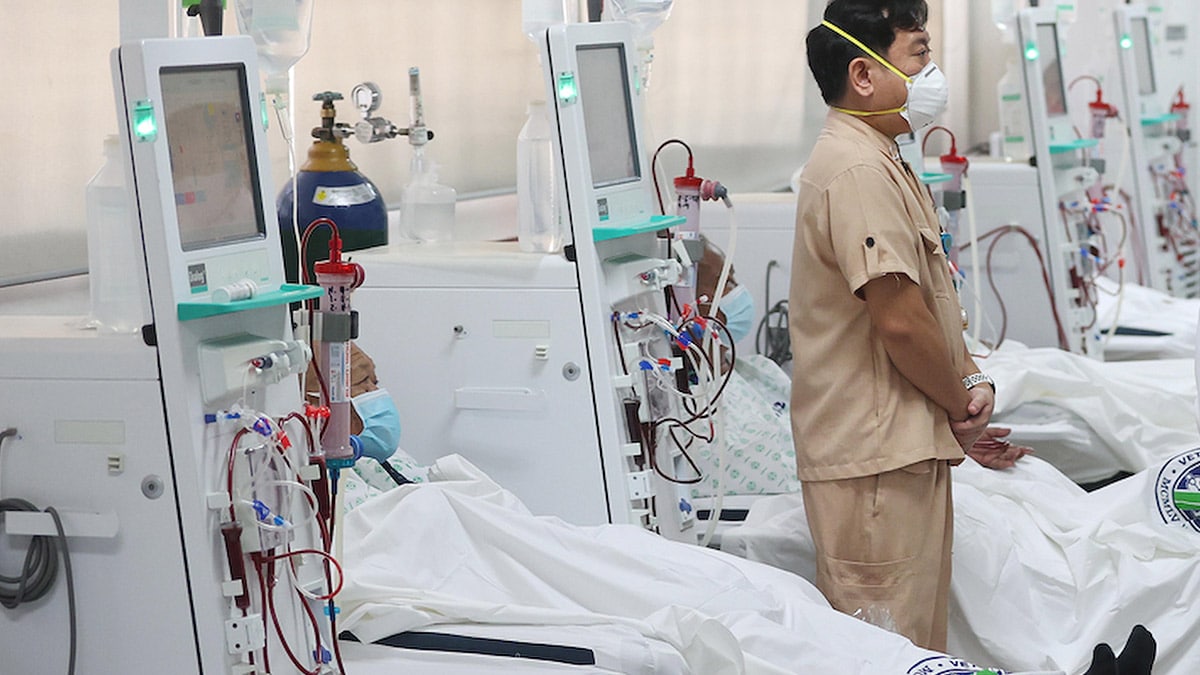30-year study: Households, not gov’t, shoulder bulk of health spending
MANILA, Philippines — For years, Stephanie (not her real name), a 48-year-old housewife from Gapan, Nueva Ecija, and her husband, a driver, have been saving up for their two sons’ college education.
But when she was diagnosed with Stage 2 breast cancer in January last year, they ended up spending all their savings and accumulating a pile of debts for her treatment.
“My left breast was removed in an operation in February last year. We thought we would only pay a small amount because PhilHealth (Philippine Health Insurance Corp.) would shoulder it. But we were surprised to learn that despite the benefit package from PhilHealth, we still needed to pay P100,000,” Stephanie told the Inquirer.
READ: Watchdogs question PhilHealth fund transfer
With the help of relatives and friends, she and her family could pay for her surgery. But then they had to raise more money, this time for chemotherapy.
Article continues after this advertisementWith PhilHealth only partially subsidizing the four sessions she had to undergo, Stephanie needed to pay P200,000, on top of her maintenance medicines, which cost at least P1,000 a month.
Article continues after this advertisementREAD: Recto favors better PhilHealth benefits over reduced contributions
Then “another misfortune,” as Stephanie called it, struck the family when her husband was hospitalized last month after he fell and hit his head.
For an eight-day hospital stay, three of them in the intensive care unit, his medical bill totaled P150,000—with PhilHealth shouldering only P11,000.
‘Out-of-pocket payments’
“No one from the government helped us. We pawned our land so we could pay some of our debts. It’s hard to get sick and be hospitalized when you are poor,” she lamented.
With public spending on health care rising in the past three decades, a study has found that the bulk of health expenses are shouldered by the average Filipino, even with the implementation of the Universal Health Care Act in 2019.
The study examined the Philippine National Health Accounts from 1991 to 2022—data spanning three decades. Conducted by Prof. Orville Solon, former dean of the University of the Philippines Diliman-School of Economics, (UPD-SE); former Prof. Alejandro Herrin, also of UPD-SE; and Dr. Michael Mo, the study and its results were presented at the first Unilab Center for Health Policy Executive Symposium in Manila on Aug. 2.
“Out-of-pocket payments from households have been the biggest contributor to healthcare spending ever since records started in 1991,” Mo said.
When health expenditures reached P1.12 trillion in 2022—45 percent or a whopping P502 billion were paid for by Filipino households.In contrast, the shares of the national government (the Department of Health, in particular) were only 21 percent (P234 billion); local government, 10 percent (P109 billion); and PhilHealth, a measly 14 percent (P153 billion), despite its mandate “to provide health insurance coverage and ensure affordable, acceptable, available and accessible health-care services for all citizens of the Philippines.”
The remaining amounts were shouldered by private insurance companies, including health maintenance organizations.
Health expenditure targets
Previous studies conducted by the same researchers showed that, besides having the least access to health care because of their limited resources, poor families spend the highest out-of-pocket expenses, even with such access.
Another finding was that the country has not met the goal set under the Health Sector Reform Agenda (HSRA) in 1999 to lower out-of-pocket spending to only 20 percent of the total health expenditure (THE).
Out-of-pocket spending in the past decade alone has been between 44 percent and 52 percent of total health spending.
“The targets for the HSRA were for national and local government spending to reach 40 percent of THE, and for social health insurance, particularly PhilHealth, to reach 30 percent of THE,” Mo said.
Despite several laws expanding the funding sources for PhilHealth, it has yet to attain its goal of covering 30 percent of THE, according to the study.
From 2014 to 2022, PhilHealth’s share in THE ranged merely between 13 percent and 19 percent.
In February this year, it implemented its first across-the-board hike in benefits since 2013, when it raised by 30 percent the benefit packages in almost all its case rates, including cancer.
Unused subsidies
In celebration of National Women’s Month this March, PhilHealth implemented a significant hike in the coverage for breast cancer under its Z Benefits package, from P100,000 to P1.4 million, up by 1,300 percent.
This could have significantly helped Stephanie with her expenses, but unfortunately, it was implemented a year late.
“I always hear that PhilHealth will be a big help to us. But I do not know if its programs are being implemented at all because it did not lower my expenses for breast cancer treatment,” she said.
In addition, PhilHealth has been criticized for remitting P89.9 billion of its unused subsidies to the national treasury between 2021 and 2023. This was based on an order from the Department of Finance, which said the money would be used to fund the government’s unprogrammed appropriations for this year.
Budget watchdogs have opposed the directive, saying the unused funds should have been used to improve and expand the benefits packages for members.
